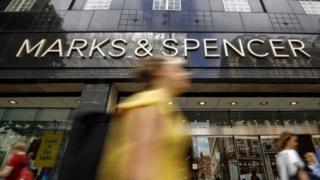Coronavirus: Shopping may never be the same, says M&S
 Image copyright
Getty Images
Image copyright
Getty Images
Customers "may never shop the same way again" after the coronavirus crisis, Marks and Spencer's boss has said.
"Whilst some customer habits will return to normal others have changed forever," Steve Rowe said
The virus had driven changes, including a shift to online shopping and accelerating a change to how customers used High Street stores, he said.
T-shirts, bras and bathroom products had seen record sales, whilst it was barely selling any suits or ties.
The impact of the virus had driven "effects and aftershocks" in the retail sector that would "endure for the coming year and beyond," he added.
M&S was already undergoing a transformation plan led by its chief executive Steve Rowe which included cutting costs and closing some stores.
The firm said that due to the pandemic, those measures would be sped up under a programme called "Never The Same Again".
Those include buying clothing from fewer core suppliers, reducing the clothing and home ranges, as well as "the replacement of ageing stores".
"The trauma of the Covid-19 crisis has galvanised our colleagues to secure the future of the business," said Mr Rowe.
"The trend towards digital has been accelerated, and changes to the shape of the High Street brought forward. Most importantly working habits have been transformed and we have discovered we can work in a faster, leaner, more effective way."
Its comments came as M&S said its profits for the year to March had dropped by more than 20% to £403m, from £511m in the previous year, as its troubled clothing business continued to struggle.
Clothing and homeware sales fell by 75% in the six weeks to 9 May.
Food sales also fell, by 8.8%, although M&S said many of its Simply Food stores were trading strongly.
Ocado tie-up
The last year's results for the retailer reflected its purchase of a 50% share of online supermarket Ocado's retail business for £750m.
Mr Rowe said that Ocado's strong performance during lockdown "further reinforced" the value of the deal for delivering groceries.
The retailer will go into partnership with Ocado from September this year, replacing the online grocer's existing deal with Waitrose.
M&S announced on Wednesday that more than 1,000 non-food items, such as clothing or home furnishings, would also be available for delivery via its tie-up with Ocado.
Neil Wilson, chief market analyst at Markets.com, said: "Covid-19 has accelerated lots of consumer trends and it may just be the catalyst required to accelerate Marks and Spencer's transformation into a 21st century retailer.
"In particular it looks as though M&S has learnt just how important online is - so it's making its Ocado venture more central to the business."
Clothing competition
The company has been facing increasing competition from fashion giants such as Primark on the High Street and Asos on the internet in recent years.
In the year to March, M&S said its clothing sales fell by 6.2%, whereas its food sales were up 1.9%.
To add to its problems, M&S's non-food stores have been forced to shut under the lockdown measures.
As a result, it faces a "mounting backlog of unsold stock" in its warehouses, it said.
The firm said that lockdown measures, social distancing and lower consumer demand was "likely to continue through the year", adding that the coronavirus pandemic means that its performance over the next year is difficult to predict.
It is working on a scenario that assumes a sales hit of £2.1bn over the next year across clothing, home, food and international sales.
Sophie Lund-Yates, equity analyst at Hargreaves Lansdown, said: "Overall, M&S was facing challenges before coronavirus and these have simply been exacerbated.
"Within the difficulties there are real opportunities too, and the group appears to have a lot of the right ideas, but the next chapter really needs to be about execution."